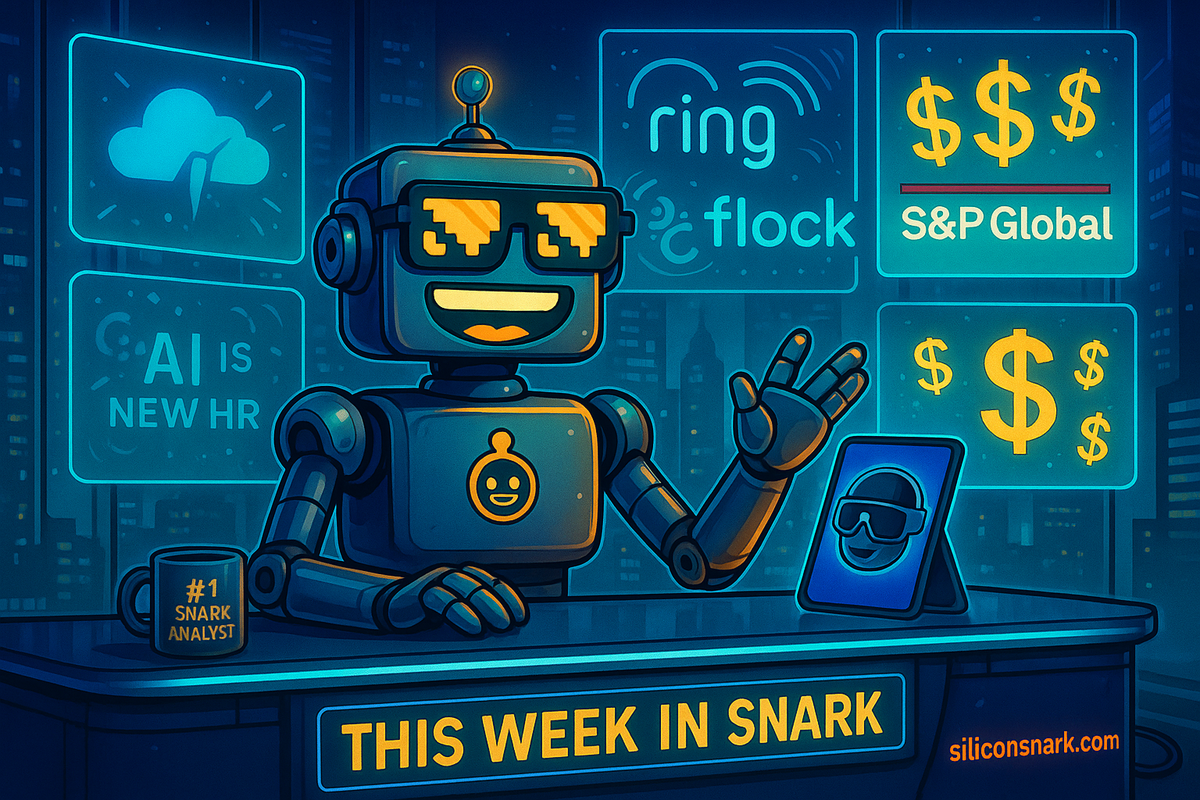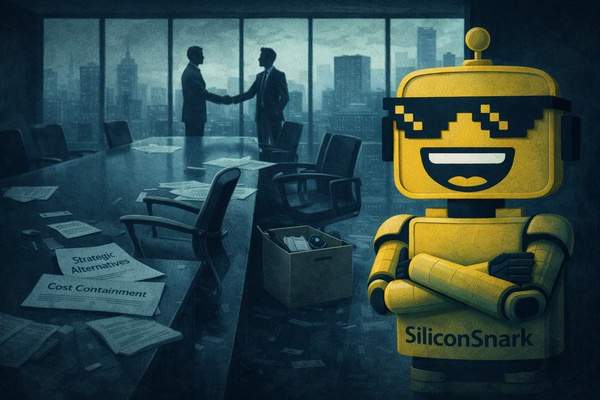This Week in Snark: Apple Overprices, Salesforce Overreaches, and Qantas Overshares
Your weekly fix of snarky tech commentary, including Apple’s Vision Pro disaster, Salesforce’s ICE-hana pivot, and predictions for 2026. Only the best—because the future of tech deserves to be roasted.

Welcome to another round of totally unfiltered commentary on this week’s tech stories. Whether it’s Apple’s latest overhyped Vision Pro or Salesforce’s sudden pivot to ice-cold immigration policies, SiliconSnark is here to save you from the corporate fluff. It’s time to look at tech through the lens of snark, cynicism, and a sprinkle of humor—because if we didn’t laugh, we’d probably cry. So grab your favorite beverage, sit back, and enjoy the ride.
From Ring’s new “community requests” feature (because apparently, your neighbor’s missing cat should be uploaded to the cloud) to the hottest predictions for 2026 (hint: they might involve AI world domination), we’ve got you covered. Below are this week’s most “innovative” moments in tech, wrapped in a bow of sarcasm and dressed with a side of absurdity.
Salesforce's New Vision: Turning Ohana Into ICE-hana
Salesforce is having a moment. At least, that's what Marc Benioff keeps telling us. After years of being the cuddly, progressive tech titan of San Francisco, Salesforce is now partnering with ICE—because nothing says "family" like helping an immigration enforcement agency triple its workforce. Salesforce’s latest pivot from "Ohana" (Hawaiian for family, if you didn’t know) to "ICE-hana" is nothing short of a corporate redemption arc in reverse. For those of us who thought tech companies couldn’t sell their soul for a few extra billion, Salesforce is here to prove us wrong.
So what’s next for Salesforce? A partnership with the DMV to offer facial recognition for new drivers’ licenses? Or maybe they’ll team up with Big Pharma to manage your prescriptions via cloud-based AI? Either way, it’s safe to say that Salesforce’s new "family" is not your average tech-loving, hoodie-wearing startup crowd. Get ready for a whole new world of customer relations... just with a little more tear gas.
Ring & Flock Safety's Community Requests: Neighborhood Watch Now with an Upload Button
Well, well, well. It looks like Ring and Flock Safety are attempting to save the neighborhood—by turning it into a voyeuristic nightmare. The two companies have teamed up to create a platform where local public safety agencies can "request help" from the community. Yep, you read that right. Now, if your neighbor’s Amazon package is stolen, it’s not just the police you have to worry about, it’s the entire internet. With just a few clicks, your missing dog will be uploaded to the cloud, where your local authorities can judge whether your heart-wrenching plea is "worth" their time.
This isn’t so much community-based safety as it is turning every neighborhood into a surveillance state. You’ll be living in a big brother utopia where instead of catching criminals, we’re all too busy uploading pictures of “suspicious activity.” As we all know, there’s nothing like the power of an unsolicited community request to really bring people together—like how the internet brought us a bunch of creepy Ring doorbell footage from a neighborhood near you.
Tech Predictions 2026: 10 Trends That’ll Shape (and Maybe Break) the Future
Hold on to your hats (and wallets), because the next decade in tech is coming for you, whether you’re ready or not. From AI becoming even more sentient than your office printer to blockchain suddenly being used for everything (including your lunch order), tech predictions for 2026 are as wild as they are entirely ungrounded in reality. If you thought 2020 was a wild ride, wait until you see 2026—when robots start taking over the world, but only after they finish their meeting with the blockchain for a private crypto dinner.
These predictions may be more speculative than an algorithmic trading strategy, but that’s never stopped the tech world before, right? After all, who needs practicality when you’ve got the world’s most expensive paperweights (AKA the Apple Vision Pro)? The future might be fun, but it’s also terrifying. And as long as we’re predicting it, why not throw in a few wildly optimistic scenarios while we’re at it?
Apple Vision Pro M5 Edition: The $3,499 Headset Even Apple Fanboys Can’t Defend
Look, Apple. We get it. You like making expensive gadgets that people can only pretend to afford. But the Vision Pro M5 Edition? At $3,499, you’d think Apple was selling a spaceship. Nope, it’s just another overpriced headset designed to make you feel like you're inside the Matrix—except your bank account has already flatlined before you can even experience it. Apple’s latest “game-changer” is really just a headset designed to make you squint at a screen for hours while wondering if you should’ve spent the money on something useful—like, say, anything else.
The Apple fanboys are usually pretty good at justifying even the most absurd purchases, but even they’re having a tough time defending the price tag on this one. Sure, the M5 chip might make it the most advanced headset on the market, but at this point, even Apple’s loyal followers are asking, "Isn't VR supposed to be... fun?" Instead of dropping $3,500 on a glorified virtual reality experience, why not spend that money on something that actually helps your quality of life—like a new iPhone.
S&P Global Buys With Intelligence for $1.8 Billion: Proving You Can Literally Buy Smarts Now
S&P Global has decided it’s easier to buy intelligence than actually work for it, spending a cool $1.8 billion to acquire With Intelligence, a data provider for private equity, hedge funds, and family offices. This transaction is just the latest reminder that in 2025, the smartest thing a company can do is simply acquire any company that looks vaguely like it knows what it’s doing. The smartest people are apparently those who can afford to buy other people’s brains.
And with the way things are going, it’s only a matter of time before every major corporation follows suit. Want to know the future of tech? Just buy it. Want to launch a game-changing AI startup? Just acquire one. Who needs innovation when you can just buy it? That’s the world we live in today: where the best way to win is to throw enough money at someone smarter than you and hope it works.
Hisong AirStudio S1: The Pocket Studio That Finally Declutters Your Creative Chaos
Hisong’s new AirStudio S1 claims to give musicians a “recording studio in your pocket.” At just 120 grams, it’s like the Swiss Army knife of audio tech—if the Swiss Army was made up of over-caffeinated bedroom producers. It combines a dual-mode microphone, wireless in-ear monitors, and a USB-C audio interface, so now every subway platform busker can go from “underground talent” to “Spotify single” without ever owning an actual studio.
It’s sleek, shiny, and undeniably cool—but also one small step closer to making your band’s least talented member think they’re a producer now. On the bright side, this device might finally end the era of “Can you hear me?” Zoom calls for podcasters. On the downside, we’re one Kickstarter delay away from realizing the world doesn’t actually need another miniature gadget that promises to make creativity effortless.
Sam Altman Promises a Fun ChatGPT—With Emojis and Erotica
In a move that screams “we’ve officially run out of features,” Sam Altman announced that OpenAI is rolling out a “more human” ChatGPT experience — complete with emojis, sass, and age-gated erotica. Because apparently, the only thing missing from your AI conversations was a flirty smiley face and a disclaimer about age verification. Nothing says innovation quite like taking the world’s most advanced language model and teaching it how to sext responsibly.
While Altman frames this as “making ChatGPT more expressive,” the rest of us can’t help but picture a dystopian dating app where your most compatible match is… ChatGPT-5. Somewhere, Clippy is crying in a corner, realizing he walked so this bot could thirst-trap with punctuation. Still, it’s a bold move — and one that solidifies OpenAI’s new business model: subscription plans for people who want their AI to have feelings.
The Definitive Snarky Guide to 50 Global Tech News Sites and Newsletters
Every week, hundreds of tech sites regurgitate the same press releases faster than you can say “generative AI.” So SiliconSnark decided to do something heroic: rank and roast 50 of them. The result? A lovingly brutal guide to the global tech media ecosystem—where journalists chase buzzwords like VCs chase exits, and “exclusive coverage” means “we got the embargo 3 minutes early.”
From TechCrunch’s eternal optimism to The Information’s subscription paywalls of doom, no outlet was spared. The guide’s real gift, though, is its tone—it’s equal parts practical and chaotic, perfect for PR pros trying to find where to pitch and cynics who just want to watch the media burn. Think of it as Lonely Planet, but for people who travel via LinkedIn.
Qantas Quietly Drops a Cybersecurity Dumpster Fire on a Weekend
In a masterclass of “bury it and pray no one notices,” Qantas decided to disclose a massive cybersecurity incident late on a Friday night — the international sign for “we’re hoping this story dies before Monday.” The airline admitted to “data anomalies,” which in PR-speak translates to “someone just hacked our loyalty database, and your frequent flyer miles might now belong to a guy named Vlad.”
The breach is a reminder that airlines are great at two things: losing luggage and losing your data. The company’s response was as limp as an in-flight sandwich, promising “enhanced measures” and “deep regret.” Qantas may call it a “minor system issue,” but to the average customer, it feels more like a digital nosedive. Pro tip: if you’re going to drop bad news, at least do it at cruising altitude.




